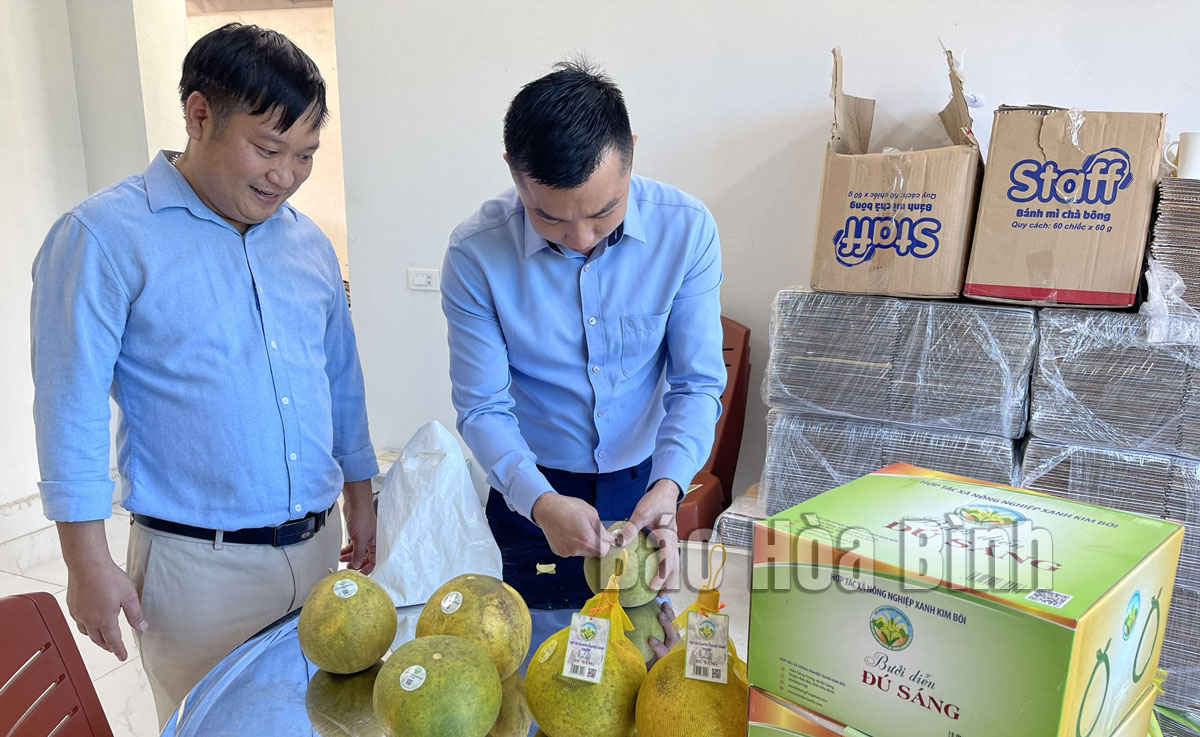
(HBO) – Kim Boi district has 10 products recognised as meeting 3-star OCOP (one commune on product) standards. In recent years, in order for OCOP products to reach the rating of 3 stars or higher, the district has paid attention to directing and implementing the OCOP Programme to communes, towns and producers with practical solutions, associated with the new-style rural area building movement in the locality.

Dien pomelo of Kim Boi
Green Agriculture Cooperative (Du Sang commune) meets 3-star OCOP standards.
Being recognised as OCOP products has helped them have
higher economic value and clear origin, and ensure food hygiene and safety,
with environmentally friendly materials used. These products have affirmed
their reputation and brand, and helped expand production and business markets,
meeting market needs, create jobs and increase incomes and the material and
spiritual life of local people. The OCOP programme has contributed to the
effective implementation of the group of criteria of "Organisation of
production and rural economic development” in the building of advanced and
model new-style rural areas.
However, Nguyen Minh Anh, deputy head of the Agriculture and
Rural Development Department of Kim Boi district, said some enterprises are
facing difficulties in processing and preservation technologies to improve
their products’ values and their capacity to supply to the market in large
quantities. They also see limitations in accessing digital technology, selling
goods through e-commerce platforms, connecting with destinations and tourist
areas.
Therefore, Kim Boi is determined to develop a plan to
implement the OCOP programme in a more effective and substantive manner, with
product quality and reputation improved.
According to the plan, in 2023, Kim Boi district will build
at least two 3-star OCOP products, while focusing on supporting producers to
maintain and improve the quality of the already-starred products.
To that end, the district concentrates on supporting the production
process and product branding. To date, Kim Boi has integrated many programmes
and financial support from the provincial Cooperative Alliance, and industrial
promotion and farmer support funds to organise training courses on technical
guidance, branding support, and trade promotion.
According to data from the Hoa Binh Provincial Party Committee, the industrial production index for the first six months of 2025 is estimated to have increased by 20% compared to the same period last year. This marks the highest year-on-year growth rate for this period since 2020.
In the first six months of 2025, Hoa Binh province’s export turnover was estimated at 1.145 billion USD, marking an 18.11% increase compared to the same period in 2024. Import turnover was estimated at $ 804 million, a 17.15% increase, which helped the province maintain a positive trade balance.
The lives of the ethnic minority farmers in Tan Lac district have gradually improved thanks to the new directions in agricultural production. This is a testament to the collective strength fostered through the professional associations and groups implemented by various levels of the district’s Farmers’ Union.
With the motto the "product quality comes first,” after nearly one year of establishment and operation, Muong village’s Clean Food Agricultural and Commercial Cooperative, located in Cau Hamlet, Hung Son Commune (Kim Boi district), has launched reputable, high-quality agricultural products to the market that are well-received by consumers. The products such as Muong village’s pork sausage, salt-cured chicken, and salt-cured pork hocks have gradually carved out a place in the market and they are on the path to obtaining the OCOP certification.
In the past, the phrase "bumper harvest, rock-bottom prices" was a familiar refrain for Vietnamese farmers engaged in fragmented, small-scale agriculture. But today, a new spirit is emerging across rural areas of Hoa Binh province - one of collaboration, organisation, and collective economic models that provide a stable foundation for production.
Maintaining growing area codes and packing facility codes in accordance with regulations is a mandatory requirement for agricultural products to be eligible for export. Recently, the Department of Agriculture and Environment of Hoa Binh province has intensified technical supervision of designated farming areas and packing facilities to safeguard the "green passport" that enables its products to access international markets.



